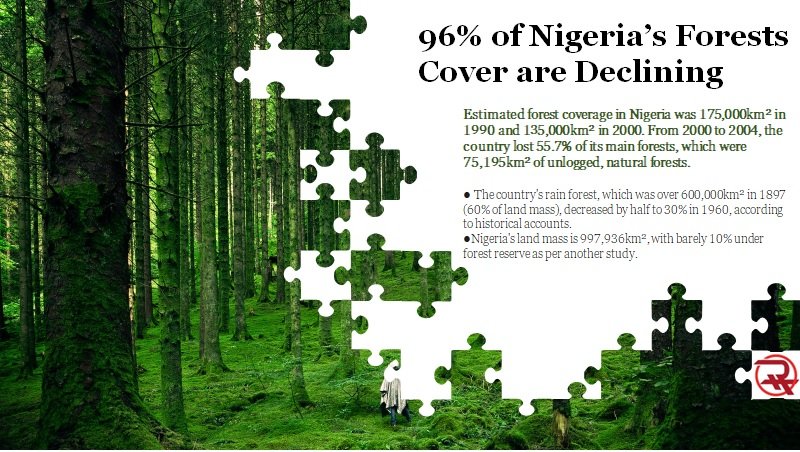Loggers have outnumbered trees in Nigeria for decades, reducing forest cover. With one of the greatest deforestation rates in the world, its forest resources are threatened. The country’s rain forest, which was over 600,000km² in 1897 (60% of land mass), decreased by half to 30% in 1960, according to historical accounts.
The UN-REDD research suggests that Nigeria’s forest cover declined 3.5% to 3.7% each year from 2000 to 2010. This means 350,000–400,000 hectares of forest area are lost annually. If the current 3.5% yearly deforestation pace continues, the country would lose all its forests by 2052 unless something is done promptly.
Importance of Forest Cover
Forests are vital to every nation’s economy. They also provide environmental, ecological, socio-cultural, scientific, and research services. The forest provides many goods and services. Wood for building, fuel, and paper are raw materials. Oilseeds, latexes, gums, resins, rattan, vanilla, and game are also found in forests. Timber industry like sawmills, paper mills, and furniture factories employ people.
Forest ecosystems offer physical, biological, and chemical benefits. These include:
- conserving soil, controlling the timing and volume of water flows, protecting water quality and maintaining aquatic habitats
- preventing disasters like floods and landslides, and moderating winds
- conserving biodiversity
- storing carbon, which mitigates climate change.
Why is Nigeria’s forest cover being depleted?
Over 80% of Nigeria’s GDP came from forestry and agriculture before the 1950s. Oil discovery in the 1950s and 1960s changed this. Forest administration rules and regulations are outdated. In addition, forest supervision, monitoring, and surveillance are weak. Basic infrastructure and staffing are lacking.
Most forest reserves no longer practice sustained yield forestry, where growth replaces product removal. Resource inventories are inadequate. Locals don’t participate enough in forest decisions. The forestry sector is also afflicted by corruption, including theft and unlawful activity. In Nigeria, primary forests are destroyed extensively. The state forestry departments have failed to protect the forest estate. Most forest reserves used for timber production are deforested and fragmented. Many were converted to other purposes. Big agriculture has destroyed most of the woodland. Naturally occurring forests are also logged illegally. Urbanization—with roads, buildings, and other infrastructure—is typically unplanned.
How can this depletion be tackled?
- Forest cover reduction could be reversed with a national Forestry Act. The country’s forest estate needs proper protection and sustainable management. Furthermore, there is a pressing need to grow and transplant trees nationwide. State governments can work with NGOs to accomplish this. After a forest is destroyed, trees are replanted. Afforestation includes planting forests on unforested area.
- Planting a variety of native tree species is important is promoting sustainable forestry. The government should strictly regulate unlawful logging and unsustainable timber exploitation.
- Remote sensors, drones, and satellite imaging enable enforcement. Local communities, traditional leaders, and NGOs must be involved in forest conservation awareness campaigns.
- Training and education of well-trained forest workers and well-equipped guards to protect forests. Local communities, forest workers, and farmers should learn about sustainable forestry and biodiversity conservation through education and training.
References

